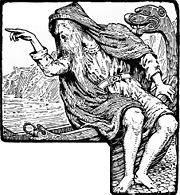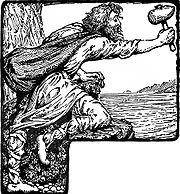
Hárbarðsljóð
Encyclopedia

Poetic Edda
The Poetic Edda is a collection of Old Norse poems primarily preserved in the Icelandic mediaeval manuscript Codex Regius. Along with Snorri Sturluson's Prose Edda, the Poetic Edda is the most important extant source on Norse mythology and Germanic heroic legends, and from the early 19th century...
, found in the Codex Regius
Codex Regius
Cōdex Rēgius is an Icelandic manuscript in which the Poetic Edda is preserved. It is made up of 45 vellum leaves, thought to have been written in the 1270s. It originally contained a further 8 leaves, which are now missing...
and AM 748 I 4to
AM 748 I 4to
AM 748 I 4to is an Icelandic vellum manuscript fragment containing several Eddaic poems. It dates to the beginning of the 14th century. The six sheets which have been preserved contain the following poems, all mythological.*Grímnismál...
manuscripts. It is a flyting
Flyting
Flyting or fliting is a contest consisting of the exchange of insults, often conducted in verse, between two parties.-Description:Flyting is a ritual, poetic exchange of insults practiced mainly between the 5th and 16th centuries. The root is the Old English word flītan meaning quarrel...
poem with figures from Norse mythology
Norse mythology
Norse mythology, a subset of Germanic mythology, is the overall term for the myths, legends and beliefs about supernatural beings of Norse pagans. It flourished prior to the Christianization of Scandinavia, during the Early Middle Ages, and passed into Nordic folklore, with some aspects surviving...
Synopsis

Thor
In Norse mythology, Thor is a hammer-wielding god associated with thunder, lightning, storms, oak trees, strength, the protection of mankind, and also hallowing, healing, and fertility...
compete in a flyting or verbal contest with one other. The ferryman Hárbarðr (Greybeard) is rude and obnoxious towards Thor who is returning to Asgard
Asgard
In Norse religion, Asgard is one of the Nine Worlds and is the country or capital city of the Norse Gods surrounded by an incomplete wall attributed to a Hrimthurs riding the stallion Svadilfari, according to Gylfaginning. Valhalla is located within Asgard...
after a journey in Jötunheimr
Jötunheimr
Jötunheimr is one of the Nine Worlds and the homeland of the Giants of Norse Mythology — Rock Giants and Frost Giants.-Legend:...
, the land of the giants. Hárbarðr obstructs his way and refuses him passage across a swollen river. He begins by saying that Thor dresses poorly and that his mother is dead. In the course of the poem, Harbard boasts of his sexual prowess, his magical and tactical abilities, asking Thor about his. Thor responds, telling how he defeated Giants. Ultimately, after mocking him at length, Harbard curses Thor and tells him to walk around.
Structure
The poem is significantly less structured than most Eddic poems, and is predominantly written in a metric form known as málaháttrMálaháttr
Málaháttr is a poetic metre in Old Norse poetry, which is usually described as "conversational style". It is similar to fornyrðislag except in that there are more syllables in a line, usually five.Poems with verses in this metre:* Atlakviða...
or "conversational style". However, other metrical forms are also to be discerned, while some of the text is pure prose. In the last decade, several scholars have concluded that the poem is an intentionally-stylized version of the traditional flyting structure.
Theories
Some early commentators, such as F. W. Bergmann and Viktor RydbergViktor Rydberg
Abraham Viktor Rydberg was a Swedish writer and a member of the Swedish Academy, 1877-1895...
argued that Hárbarð was in fact Loki. Although the name Harbard means "Grey beard" Thor repeatedly indicates that he sees a young man before him. Some believe that Hárbarðr's confessed exploits also are allegedly more akin to those of Loki
Loki
In Norse mythology, Loki or Loke is a god or jötunn . Loki is the son of Fárbauti and Laufey, and the brother of Helblindi and Býleistr. By the jötunn Angrboða, Loki is the father of Hel, the wolf Fenrir, and the world serpent Jörmungandr. By his wife Sigyn, Loki is the father of Nari or Narfi...
than Odin. http://www.northvegr.org/lore/rydberg/116.php However, Hárbarðr repeatedly boasts of his conquests of giantesses, as does Odin in Havamal
Hávamál
Hávamál is presented as a single poem in the Poetic Edda, a collection of Old Norse poems from the Viking age. The poem, itself a combination of different poems, is largely gnomic, presenting advice for living, proper conduct and wisdom....
. Loki in Lokasenna
Lokasenna
Lokasenna is one of the poems of the Poetic Edda. The poem presents flyting between the gods and Loki....
and Harbard in Hárbarðsljóð both accuse Thor's wife Sif
Sif
In Norse mythology, Sif is a goddess associated with earth. Sif is attested in the Poetic Edda, compiled in the 13th century from earlier traditional sources, and the Prose Edda, written in the 13th century by Snorri Sturluson, and in the poetry of skalds...
of adultery
Adultery
Adultery is sexual infidelity to one's spouse, and is a form of extramarital sex. It originally referred only to sex between a woman who was married and a person other than her spouse. Even in cases of separation from one's spouse, an extramarital affair is still considered adultery.Adultery is...
. They also speak identical half-lines, accusing Thor of being unmanly. Despite these arguments, this theory was rejected by later scholars such as Finnur Jónsson
Finnur Jónsson
Finnur Jónsson was an Icelandic philologist who made extensive contributions to the study of Old Norse literature.Finnur graduated from Menntaskólinn í Reykjavík in 1878 and went to Denmark for further studies at the University of Copenhagen. He received a doctorate in philology in 1884 with a...
, Fredrick Sander, and Felix Niedner, in favor of identifying Harbard with Odin, based, among other things, on the stament in Grimnismál 47 that Harbard is a name of Odin.
English translations
- Harbarthsljoth Translation and commentary by Henry A. Bellows
- The Song of Harbard Translation by A. S. Cottle
Old Norse editions
- Hárbarðsljóð Sophus BuggeSophus BuggeSophus Bugge was a noted Norwegian philologist and linguist. His scientific work was directed to the study of runic inscriptions and Norse philology. Bugge is best known for his theories and his work on the runic alphabet and the Poetic Edda and Prose Edda. -Background:Elseus Sophus Bugge was...
's edition of the manuscript text - Hárbarðsljóð Guðni Jónsson's edition of the text with normalized spelling

